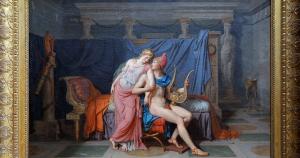 I read Iliad as a boy . . . Badly. I wished to see Helen, the face that launched a thousand ships and burnt the topless towers of Ilium. I did not wish to speak to Helen, honor Helen, be human with Helen.
I read Iliad as a boy . . . Badly. I wished to see Helen, the face that launched a thousand ships and burnt the topless towers of Ilium. I did not wish to speak to Helen, honor Helen, be human with Helen.
This was unwise. To be like Paris is to be the worst character in Iliad. Paris betrays every honorable value for “love” that is just Eros. Helen is a “prize,” an object to be won, when reality demands we see Helen as a human.
Achilles, the greatest Greek hero, does the same thing. He reduces a woman he “loves” to a prize. Most importantly it is harmful to her, but it is also devastating to the Greeks. You cannot treat a soul created in the Image of God as a “prize” to be won and not do great damage to the cosmos.
Why?
You have taken an eternal thing, a human soul, and used that soul as a means to some selfish end. Achilles fractures the Greek army to get his prize back and many die, including his friend Patroclus. Paris destroys everything around him and the greatest pity is that he is one of the last to suffer.Things are bad when you root for death, but Paris is so bad that a sentimental reader has no interest in his triumphs.
No human can be a means to an end. Every human must be the end for any other human. We are not God, not even gods, so we must honor the sameness of all humans. They are not for us. We are not for them. Yet men, or at least this man, can struggle to see beyond our need and desire.
No man should treat women as “other,” because the totality of humanity is woman and man.
“Are women human?”
Dorothy Sayers asked and young me read and learned: bad people don’t know women are human. They think mankind is normally men and women are some sort of add on.
No.
Stop. Think about it.
No.
Advertising not withstanding, neither men nor women are products.
If you knew old women from West Virginia, you knew people who were not shaped by media images of women and just were women.These humans knew there were men and women, the difference was delightful, but they were not consumed with it. Against this was 1970’s media culture that gave me Charlies Angels as opposed to actual women I knew. The thoughtful people in my life, including my mom, said: “Women are human first. Women are their own selves. Women are not ‘the other’ except to you.”
I did not listen to wisdom as a young adult often enough, but wisdom did lead me home.
One contributing factor was Homer’s Iliad in graduate school read slowly with a brilliant teacher. At first the Iliad seems like a “boy book,” but then any human realizes that the tragedy of Iliad is men without women and women without voices. In the (limited) Homeric context, this is to be lost, away from home, but that is the least of it.
Imagine when being lost is the least of the bad!
The inability of men and women to hear each other is fatal to humanity in Iliad (and life!). The gods (or fate) are so powerful that half of humanity is not enough to survive. Think of Achilles who is divided from the first line between his divine self and his human self: his goddess mother and his human father. He is called in that first line the son of Peleus, his human father, but it is his goddess mother who acts in the poem. He needs her, not him. His lack of human mother makes him a pawn of Zeus and fate. He has no woman’s voice in his life, since he treats his lovers as objects and not as human. Achilles is torn apart and never finds full humanity.
Nobody does in Iliad, though Hector comes closest in the love, genuine human love, he shows to Andromache. She is human to him and so Hector is the most sympathetic. The descriptions Homer uses for Hector are revealing. He has a gleaming helmet: he knows his role and persists. He is man-slaying: he is good at his role. He is a breaker/tamer of horses. Hector kills men, not animals, he tames animals not men.
Are men human?
At the end of Iliad, the answer is “no, not without women.”












